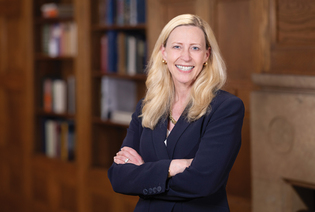
Dan Renzetti
President Maurie McInnis
’96PhD.
View full image
The following is excerpted from President McInnis’s address at the Graduate School matriculation ceremony on August 19.
These exercises carry a special resonance for me because some thirty-five years ago, I sat exactly where you are as a matriculating graduate student. I naturally find myself reflecting on the moment I set foot in New Haven. I was both excited and terrified. I had never been here before, I didn’t know anybody, and I certainly wondered if I was good enough to make it.
As an art and architectural historian, I marveled at New Haven and Yale and quickly immersed myself in getting to know my new home, working in the Yale University Art Gallery, and exploring my new state by crawling through the attics of the earliest surviving houses in Connecticut with Professor Abbott Lowell Cummings.
My journey here, to the finest university in the world, was profoundly influenced by my family. I am a fourth-generation teacher. My great-grandparents ran a two-room schoolhouse in Frostproof, Florida, in the early decades of the twentieth century.
When I was a graduate student, I saw the enduring impact a teacher can have when I attended my grandfather’s funeral, also in a small Florida town. He had been a math teacher, a football coach, and a principal.
Although my grandfather had retired decades before, the line stretched around the block and was filled with former students who wanted to pay their respects to a man each of them told me had made a lasting difference in their lives.
I, like them, also stand here today in large part because of a teacher—a faculty member at the University of Virginia, where I got my undergraduate degree, the late Christopher Johns. He urged me to pursue the passion for art history that I had cultivated in his classes. And he told me unequivocally that if I could get accepted to Yale’s PhD program, I absolutely must attend.
I trust that each of you, one day, will similarly support the aspirations of someone along their life’s journey.
Of course, I followed Professor Johns’s advice to attend graduate school at Yale because of its unparalleled collections and unquestioned preeminence.
At most universities, for example, I would have taught the history of art with slides on a screen. But here, I taught in front of the finest university art collection in the country—and learned from a constellation of specialists at the school that awarded the country’s first PhD.
I saw, as you soon will, that ours is an exceptional education. Here, you will learn to specialize, not only in how to acquire information but also how to apply it in the service of humanity. You will add, I am sure, to the sum of knowledge in your field and enrich the education of generations that will come after you. That is the purpose of your education here; to learn, research, create, discover, and collaborate with faculty members and your fellow students.
Regardless of how you found your way here, I encourage you to continue your studies by ever seeking to be curious.
Even when the time comes for you to teach—when you are ostensibly the most expert person in the room—I encourage you to do so with inquisitiveness. To listen to the questions from your students—and to have them elicit more questions from you. This approach of embracing an open exchange of ideas and viewpoints as an educator has awakened minds, driven innovations, and transformed lives.
One of the great joys of teaching in my field of art history, for example, is that even though I may have spent hours with a painting, it is often when someone comes to it afresh, with a new perspective, that I gain an expanded understanding.
While yes, much of the time you are spending here is meant to deepen your specialized knowledge, I encourage you to connect with people who are in fields and disciplines other than your own. It is sometimes an outsider’s perspective that leads to the question or insight that unlocks a new discovery.
For Yalies, education is not merely what we know but who we encounter.
That is why the Graduate School’s mission places distinctive emphasis on “drawing upon the strengths of a collaborative, diverse, and inclusive community of scholars and researchers.”
A community that has become ever more excellent—and, I hope, ever more curious—with your arrival.
I look forward to learning where your curiosity—that great instrument of discovery—will lead you in the years ahead.
Thank you, and welcome to Yale.
 loading
loading